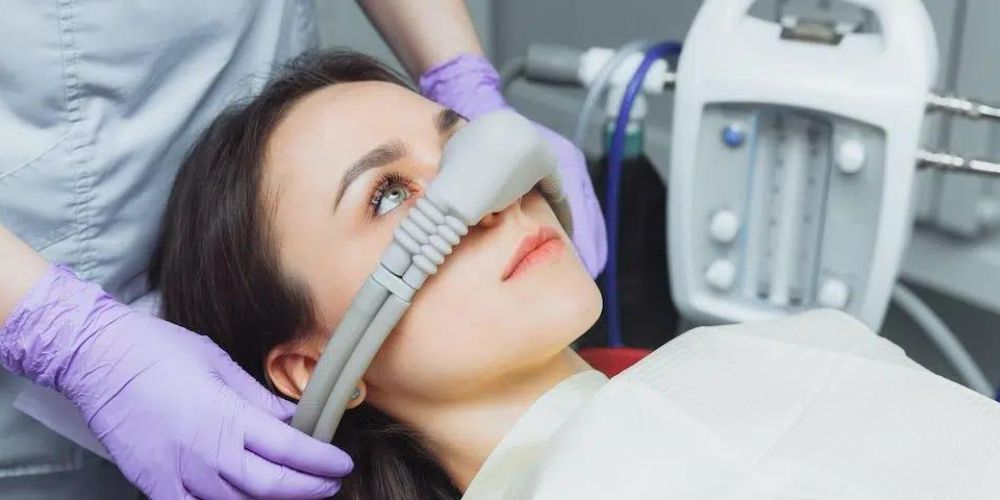Published on January 16, 2024

Dental anxiety is a common hurdle that prevents many individuals from seeking necessary dental care. The fear of dental procedures can range from mild unease to paralyzing dread, leading to avoidance of appointments and, ultimately, compromised oral health. However, there’s a solution that can turn this anxiety-laden situation around – sedation dentistry. In this comprehensive guide, we will delve into how sedation dentistry works, its various forms, and the myriad ways it can ease dental anxiety.
Understanding Dental Anxiety
Dental anxiety is when people feel scared or nervous about going to the dentist. Lots of people feel this way, and it’s more common than you might think. The fear can come from different things, like worries about pain, needles, or even just being in the dental chair.
This fear is a real problem because it stops many people from going to the dentist. They might delay or avoid visits altogether. Unfortunately, this can lead to bigger dental issues over time. Sedation dentistry is a solution to help overcome these fears and make dental visits less scary.
Dental anxiety can be different for everyone. Some people might feel a little uneasy, while others might be really afraid. The fear is real, and it’s important to address it so that people can get the dental care they need without feeling so worried.
Understanding Sedation Dentistry and Its Types
Sedation dentistry is when dentists use medicines to help people relax during dental work. It’s like giving a little help to make the dental experience more comfortable, especially for those who feel nervous or scared. There are different types of sedation:
- Nitrous Oxide (Laughing Gas): It’s a gentle sedative given through a mask. It helps people relax without making them fall asleep.
- Oral Sedation: This is medicine in pill form. Patients take it before the appointment, and it makes them feel tired but still aware.
- Intravenous (IV) Sedation: Medicine is given through a small needle into the bloodstream. It makes people more relaxed, and they might not remember much about the procedure.
- General Anesthesia: This is for big procedures. It makes people completely unconscious, so they don’t feel or remember anything during the dental work.
The goal of sedation dentistry is to make dental visits less stressful. It’s like creating a more peaceful environment for patients so they can get the care they need without feeling so worried.
How Sedation Dentistry Eases Dental Anxiety
Promotes Relaxation: Sedation dentistry helps people relax by using medications that reduce anxiety and stress. Patients feel calmer, making it easier for them to go through dental procedures without being too nervous.
Pain Management: Sedation ensures that patients experience less pain during and after dental procedures. The fear of pain is reduced, making the overall dental experience more comfortable and less intimidating.
Time Perception Alteration: Sedation can make the perception of time feel different during dental procedures. What may seem like a long time to an anxious patient can feel shorter, making the experience seem less daunting.
Enhanced Communication: Sedation allows patients to communicate better with their dentists during procedures. Patients can express any discomfort or concerns, giving them a sense of control and making the process more manageable.
Memory Suppression: Sedation dentistry can make patients forget or remember less about the dental procedure. For those with past traumatic experiences, it reduces anxiety about future visits by lessening the memory of discomfort.
Lowered Gag Reflex: Sedation can decrease the sensitivity of the gag reflex. This is especially helpful during procedures that might trigger the gag reflex. As a result, it makes the experience more tolerable for patients.
Choosing the Right Sedation Option
Deciding the best sedation method depends on a few things. Here’s a simple breakdown:
Level of Anxiety: Think about how anxious you feel. The more anxious, the stronger the sedation might need to be.
Medical History: Your health background is important. Some sedation methods may not be suitable if you have certain health conditions.
Type of Dental Procedure: Consider the kind of dental work you’re getting. Different procedures might need different levels of sedation.
Nitrous Oxide for Mild Anxiety: If you’re a bit nervous, laughing gas might be enough. It’s a light sedation option that works well for less anxious situations.
Oral Sedation for Moderate Anxiety: For a bit more anxiety, taking a pill before the appointment helps. It makes you tired but still aware during the procedure.
IV Sedation for Deeper Relaxation: If you’re quite anxious, IV sedation might be suggested. It gives a deeper level of relaxation, which is useful for more extensive dental work.
Sedation dentistry stands as a beacon of hope for individuals grappling with dental anxiety. By providing a range of sedation options, dentists can tailor the experience to each patient’s specific needs. As a result, it fosters a more relaxed and positive atmosphere. Remember, a trip to the dentist doesn’t have to be a daunting experience – with sedation dentistry, a brighter, healthier smile is just a comfortable appointment away.
Sedation Dentistry FAQs
Q: Who can benefit from sedation dentistry?
A: Individuals with dental phobia, anxiety, or difficulty sitting still for extended periods often benefit from sedation dentistry. It’s also useful for complex procedures or those with a low pain threshold.
Q: Is sedation dentistry safe?
A: Yes, when administered by a trained and experienced dental professional, sedation dentistry is generally safe. Patients are carefully monitored throughout the procedure to ensure their well-being.
Q: How long does the effect of sedation last?
A: The duration varies based on the type of sedation. Nitrous oxide wears off quickly, while oral sedatives may have a longer-lasting effect. The dentist will provide post-sedation guidelines.
Q: Can I eat before a sedation dentistry appointment?
A: For certain types of sedation, fasting is necessary before the procedure. Your dentist will provide specific instructions regarding eating and drinking in the hours leading up to your appointment.
